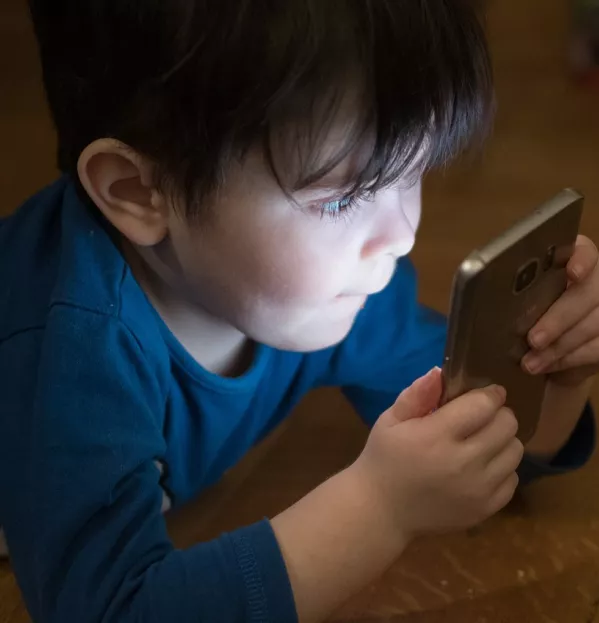
- Home
- Teaching & Learning
- Primary
- Why we teach mobile phone safety in KS1
Why we teach mobile phone safety in KS1

The debate around banning smartphones for young people has gained momentum in recent months. The Commons Education Select Committee has stated that the negative effects of screen time and social media outweigh the positives of young children having phones.
Many secondary schools have already taken steps to ban phones during the school day, but by that age, it is often too late.
According to OfcomŌĆÖs latest report, 85 per cent of children aged 3 to 5 go online and 19 per cent have their own mobile phone. More than a third of children in this age group use social media.
As a primary school leader, I find these statistics deeply alarming. But it is what I see in classrooms that concerns me even more. I have seen pupils in our early years foundation stage who can swipe through apps and unlock phones with ease - but who struggle to hold a pencil, to focus their attention or to communicate clearly.
At Ark, teachers across our schools comment on the noticeable decline in fine and gross motor skills, and the growing number of speech and language delays.
It is hard not to ask whether screen time is playing a significant role in the decline of the basic skills in our youngest pupils.
Teaching mobile phone safety early
It is obvious to me that we must respond sooner. Mobile phone safety and digital awareness should not begin in secondary school, once children are already immersed in online spaces.
I believe it must start much earlier, in key stage 1, when we still have the chance to be preventative, not just reactive.
When, as a trust, we began to look for a personal, social, health and economic (PSHE) education curriculum that truly met the needs of our primary pupils across our network, we realised how few resources directly addressed the digital challenges that younger children face today.
We needed something that would support personal and social development while also equipping pupils with the knowledge to navigate the online world safely and responsibly.
Life Lessons was already the preferred relationships, sex and health education (RSHE) curriculum for secondary schools across our trust, so we engaged with the team to explore a possible partnership.
We were pleased to find that they were already in the early stages of developing a primary curriculum. Their initial work closely aligned with our thinking around early intervention and digital safety.
The primary ŌĆ£digital livesŌĆØ unit, introduced from Year 1, helps pupils to understand how the internet and digital devices can be used safely to find information and to communicate with others. It explores the role of the internet in everyday life (including the positives) and introduces the idea that not everything we see online is true. It also covers what children should do if something online makes them feel unsure or uncomfortable.
While not every school will use the same resource, the principles behind this approach are widely applicable.
What really matters is that this work begins early. Teaching about mobile phones in key stage 1 gives pupils the time and support they need to build digital awareness before they face the full pressures of an online world.
Alongside this, here are five practical steps that your primary school can take to help keep even the youngest learners safe.
1. Make your school phone-free
Create a clear policy that removes smartphones from the primary school day. If pupils bring them for safety, ensure they are switched off and stored securely during school hours.
2. Encourage phone-free pick-up and drop-off
Ask parents and carers to put phones away at the school gate. This small shift creates opportunities for real conversation and connection at the start and end of the day.
3. Run parent information sessions
Offer regular workshops on the risks of early smartphone use, from disrupted sleep and attention difficulties to delayed speech and social development. Parents often are unaware of the dangers and how to manage this risk for their children.
4. Respond to childrenŌĆÖs lived experiences
Embed digital safety and healthy tech habits into the PSHE curriculum from key stage 1, using real-life, age-appropriate examples that reflect childrenŌĆÖs lived experiences.
5. Model healthy habits
Encourage staff and families to reflect on their own smartphone use. Children copy what they see, so consistent adult behaviour is key to building long-term digital awareness.
The message is simple: five-year-olds are not ready for smartphones. Young children need time to develop, connect and grow without the pressures of a digital world that they cannot yet manage.
Primary schools can lead the way by taking small, preventative steps that protect childhood and promote wellbeing. This work starts now.
Daniela Grasso is executive principal at Ark Schools
You can now get the UKŌĆÖs most-trusted source of education news in a mobile app. Get Tes magazine on and on
Want to keep reading for free?
Register with Tes and you can read five free articles every month, plus you'll have access to our range of award-winning newsletters.
Register with Tes and you can read five free articles every month, plus you'll have access to our range of award-winning newsletters.
Keep reading for just ┬Ż4.90 per month
You've reached your limit of free articles this month. Subscribe for ┬Ż4.90 per month for three months and get:
- Unlimited access to all Tes magazine content
- Exclusive subscriber-only stories
- Award-winning email newsletters
You've reached your limit of free articles this month. Subscribe for ┬Ż4.90 per month for three months and get:
- Unlimited access to all Tes magazine content
- Exclusive subscriber-only stories
- Award-winning email newsletters
topics in this article



